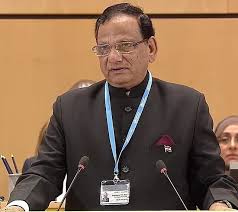
Eliminating Thalassemia Requires Unified Action and Equitable Care: Prof VK Paul
“Thalassemia care in India demands a united effort to strengthen prevention, enable early diagnosis, and provide access to advanced treatment options,” said Prof. V.K. Paul, Member (Health), NITI Aayog, at the Thalassemia Conclave 2024 in Delhi. He emphasized the urgent need to address thalassemia as a significant public health challenge, stating, “Together, we can ensure equitable access to care and work towards eliminating thalassemia as a public health burden in our country.”
Prof. Paul’s remarks set the tone for the conclave, which brought together policymakers, healthcare leaders, patient advocates, and caregivers to discuss actionable strategies for improving thalassemia care in India. “This conclave serves as a pivotal platform to unite stakeholders in addressing the challenges posed by thalassemia and driving a collective mission to create a thalassemia-free future,” he added.
A Unified Front Against Thalassemia
The event underscored the critical need for collaboration among healthcare providers, policymakers, and patient advocacy groups. Mr. Deepak Chopra, President of Thalassemics India, stressed the importance of addressing the complexities of managing thalassemia major. “Our collective goal is to raise awareness and collaborate towards making India thalassemia-free,” he said.
Mrs. Shobha Tuli, Secretary of Thalassemics India, highlighted the significance of including thalassemia care in national health programs like the National Health Mission (NHM) and Ayushman Bharat PM-JAY. “Our mission is to raise awareness, ensure uniform treatment, and build a future where no child is born with thalassemia major,” she asserted.
Policy and Technological Interventions
Mr. Saurabh Jain, Joint Secretary-Policy, Ministry of Health & Family Welfare, emphasized the role of early identification and data-driven approaches in transforming thalassemia care. “With 5–10% of the population carrying the beta-thalassemia trait, leveraging technology for screening, diagnosis, and treatment is critical. Addressing challenges like antigen-matched blood and high bone marrow transplant costs must be prioritized,” he said.
Maj. Gen. (Prof.) Atul Kotwal, Executive Director of the National Health Systems Resource Centre, detailed efforts to integrate genetic diseases into India’s healthcare framework. “Centers of Excellence in 19 states will offer advanced diagnostics and bone marrow transplants. Using digital platforms like the Ayushman Bharat Digital Mission, we aim to deliver high-quality, accessible care even in remote areas,” he noted.
Focus on Prevention and Regional Models
Prevention remained a key focus of the conclave, with sessions chaired by leading experts like Dr. Dipti Jain and Dr. Jyoti Kotwal. Dr. Anupam Sachdev, Co-Director of Pediatrics at Sir Ganga Ram Hospital, emphasized the importance of robust screening programs and public awareness campaigns to reduce the prevalence of thalassemia.
State-specific models showcased innovative approaches to prevention. Dr. Ranjeeth M.C., Head of Operations at HINDLABS, presented the Maharashtra Screening Model, while Dr. R.K. Jena, Professor at SCB Medical College, detailed the Odisha Screening Model. These regional efforts demonstrated how localized strategies could significantly contribute to national-level objectives.
Advanced Treatment and Patient Care
Dr. V.K. Khanna, Director at the Institute of Child Health, Sir Ganga Ram Hospital, highlighted advancements in treatment, including regular blood transfusions and iron chelation therapy to prevent complications like iron overload. “Our focus is on delivering the best care available today while striving to prevent thalassemia in newborns,” he said.
Insights from experts like Dr. Seema Kapoor, Delhi State Blood Nodal Officer, and Dr. Tulika Seth, Professor of Hematology at AIIMS, shed light on the challenges of managing thalassemia and strategies for improving patient outcomes.
The Road Ahead
The conclave concluded with a collective pledge to intensify efforts in eliminating thalassemia through equitable care, public health campaigns, and advancements in medical research. Prof. Paul’s call for unified action served as a rallying cry for stakeholders to work towards a future where thalassemia no longer burdens the nation.
By leveraging innovation, fostering collaboration, and prioritizing prevention, India can pave the way for a healthier, thalassemia-free future.